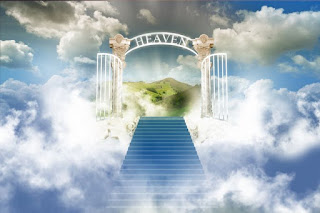Which is why we drink it here.
"In Heaven There Is No Beer" is a song
about the existential pleasures
of beer drinking.
The title of the song is the reason for drinking beer while you are still alive.
The song in German is "Im Himmel gibt's kein Bier", in Spanish,
"En El Cielo No Hay Cerveza". It was originally composed
as a movie score for the film Die Fischerin vom Bodensee, 1956,
by Ernst
Neubach and Ralph Maria Siegel The English lyrics are
credited to Art Walunas.
Atongo
Zimba recorded a version as well as Dr.
Demento.The song was the inspiration for the title of the 1984
film and 1985 Sundance Film Festival winner, In Heaven There Is No Beer? which
also featured the song "Who Stole the Kishka?" A
version with different lyrics, titled "Es gibt kein Bier auf Hawaii"
("There Is No Beer in Hawaii") was performed by the German singer
Paul Kuhn in 1963.
At some point in our lives, we’ve all sung the song a few
times – and it didn’t really matter if we were singing it off key, because
everybody was off key too. However, here’s a question that none of us ever
asked.
Does heaven actually exist?
Not everyone thinks so.
At some point during the year, I read a book where the
author theorized that heaven was a concept made up by early leaders of the
Catholic church to keep its followers in line. It’s no secret that the Catholic
church, and leaders of other churches, use the concept to ensure that the folks
in their congregation adhered to at least some semblance of piety and
righteousness, but here’s a surprise.
Heaven was NOT an invention of the early Christian church.
Easy. Just ask somebody who’s been there.
Thousands of people have experienced what is called a
near-death experience. A near-death experience (NDE) is
a personal experience associated with death or impending death. When positive, such experiences may encompass
a variety of sensations including detachment from the body, feelings of levitation,
total serenity, security, warmth, the experience of absolute dissolution, and
the presence of a light. When negative, such experiences may include sensations
of anguish and distress. NDEs are a recognized part of some transcendental and religious beliefs in an afterlife.
There have been at least a dozen books published about the afterlife, but the
most convincing one is “Proof of Heaven’, by Eben Alexander, M.D., which I
actually read a few years back.
Near-death experiences, or NDEs, are controversial.
Thousands of people have had them, but many in the scientific community have
argued that they are impossible. Dr. Eben Alexander was one of those people.
A highly trained neurosurgeon who had operated on thousands
of brains in the course of his career, Alexander knew that what people of faith
call the “soul” is really a product of brain chemistry. NDEs, he would have
been the first to explain, might feel real to the people having them, but in
truth they are simply fantasies produced by brains under extreme stress.
Then came the day when Dr. Alexander’s own brain was
attacked by an extremely rare illness. The part of the brain that controls
thought and emotion—and in essence makes us human— shut down completely. For
seven days Alexander lay in a hospital bed in a deep coma. Then, as his doctors
weighed the possibility of stopping treatment, Alexander’s eyes popped open. He
had come back.
Alexander’s recovery is by all accounts a medical miracle.
But the real miracle of his story lies elsewhere. While his body lay in coma,
Alexander journeyed beyond this world and encountered an angelic being who
guided him into the deepest realms of super-physical existence. There he met,
and spoke with, the Divine source of the universe itself.
This story sounds like the wild and wonderful imaginings
of a skilled fantasy writer,but it is not fantasy. Before Alexander underwent
his journey, he could not reconcile his knowledge of neuroscience with any
belief in heaven, God, or the soul. That difficulty with belief created an
empty space that no professional triumph could erase. Today he is a doctor who
believes that true health can be achieved only when we realize that God and the
soul are real and that death is not the end of personal existence but only a
transition.
In the movie “Caddy Shack”, Bill Murray winds up being the
caddy for the Dali Lama himself. At the end of the round, the Dali Lama does
not give Bill Murray a tip, which prompts Bill Murray to ask why not.
The Dali Lama’s response was this:
“Oh, I can’t give you any money, but when you die, on your
deathbed, you will receive total consciousness”.
Murray’s response was “So I got that going for me. Which is nice”.
At some point in time, I’m likely to achieve total consciousness,
but I’m going to miss the beer.


No comments:
Post a Comment